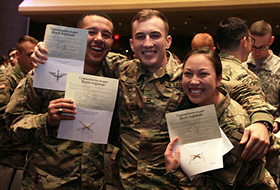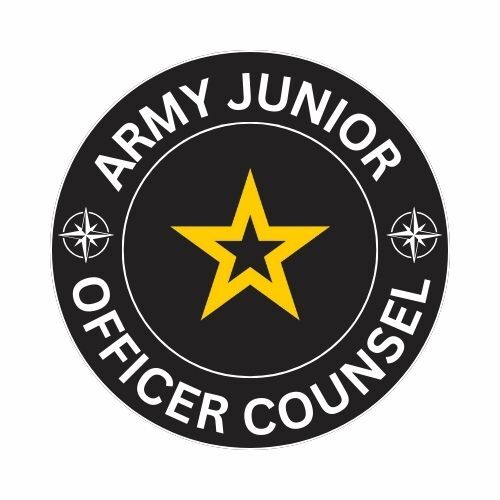Student to Lieutenant Series — Part 1
This is part one of the “Student to Lieutenant” series. This week’s article starts the discussion for Phase 1: From Branch Night to Graduation from your commissioning source. We’ll dissect this Phase until the horse is dead, and then move to the next phase.
Phase 1: Receiving your #Branch to Commissioning
Phase 2: Commissiong to Reporting to BOLC
Phase 3: Graduating BOLC & Follow-on Schools
Phase 4: Arriving at your first Unit & first Assignment

Congratulations!
You have a branch. Let’s shoot the white elephant first. This branch wasn’t your first choice? What’s that? Not even in your top three? Holy smokes! It was ranked number 11 on your list… Okay, okay, here’s the deal, and I apologize this does not seem to be articulated well to officer candidates in any of the commissioning sources; the Army is providing you an opportunity to serve and Lead, and all that hard work over the last X years earned you this awesome opportunity to serve Soldiers. ALL Soldiers deserve good Leaders. Chemical Corps Soldiers, Signal Corps Soldiers, Armor Soldiers… Army HRC be like, “You get a good Leader, and you get a good Leader, everybody is getting a good Leader!!!” Well, that’s the idea anyway, but it’s a bit hard to achieve if individual preferences are the sole factor in determining branch assignment.
So, it’s too cumbersome to explain in a short article, but there’s a three-tier system to the Order of Merit List for branch assignments. Then, branches all have different sizes and officer fill requirements that change annually. Then, graduation dates vary and BOLC course dates vary… All these variables play a factor in determining final branch assignments. Here’s what you need to take away: Your preferences ARE taken into consideration. There are computer algorithms that compute the assignments. There’s not much value in looking backward. You will have a chance to lead in ANY branch, and EVERY branch is important. “There are no small parts, only small actors.”
So, we’ve made peace with our branch assignment. Moving on.
Step 1: Time Analysis! How much usable time do you have between now and graduation? OCS? Yeah, not much. USMA/ROTC, a little bit more but there’s the Spring Formal to plan, and your senior project is due… You’re busy, time is limited. So, prioritize and set some goals.
Step 2: Find a branch mentor/counselor/representative. They go by different names at different institutions. But, make initial contact with someone that can give you insight to your specific branch. They will give you #protips, and can help you prioritize further.
Step 3: Fitness! Either sustain some or get some. But, regardless of branch, all BOLCs are a TRADOC regulated Initial Military Training (IMT) course. That means you will take at least two APFTs: Initial entry and final. #PTisFree. Because BOLCs are IMT (not Initial Entry Training, IET), you can be administratively separated for failure to meet minimum APFT standards at the initial (NOT final) APFT. So, find a Leader or peer you trust, and have them grade you on a diagnostic APFT. Then, make a plan to get better. If you want an APFT improvement plan — well, Google it, or, you can post a request on this forum, I’ll send you one. If spending money will make you “commit” http://mtntactical.com/shop/apft-plan/.

Step 4 (most often overlooked): Go to your BOLC’s respective website(s)! Almost all BOLCs maintain official websites, social media, and reddit pages, too (see below signature line). Set a timer, seriously. Set a timer, 45 minutes that’s all the effort I’m asking. Search, find and save relevant information about your BOLC in a folder on your computer, tablet, smartphone, or print it all. Then, peruse as you have time. While you poop. While you wait for your Uber. While you’re not paying attention in CS 302… Many BOLC’s have reading lists. You can start those books early. Many BOLC’s have packing lists and reporting information, and PT improvement plans… Review all of this BEFORE graduation, because if there is information missing, you have resources and staff at your commissioning source that can help you find the information you need.
Step 5 (Bonus Points): Finally, start thinking about intelligent questions. Take some time to reflect about what you do and/or don’t actually know about your branch and your role as a Leader in that branch. BOLC will provide you opportunities to ask those questions to senior Leaders, experienced tactical level Leaders, Non-Commissioned Officers… Start making a list of good questions that will prepare you to be a good leader.Tim Ferriss: How to Ask Better Questions — https://youtu.be/ALMg-7-2trY.
Attachments:
Leader Certification Matrix
~Jeff
The Student-to-Lieutenant Series
Part 1 – Phase 1: Receiving your Branch
Part 2 – Phase 2: Commissioning and Reporting to BOLC (Snowbird Status)
Part 3 – BOLC and Follow-on Schools
Part 4 – Operating Expenses and Where to Live
Part 5 – Operating Expenses and Where to Live (part 2)
Part 6 – Phase 3: Graduating BOLC & Follow-on Schools
Part 7 – Phase 4: Reporting to your First Unit



